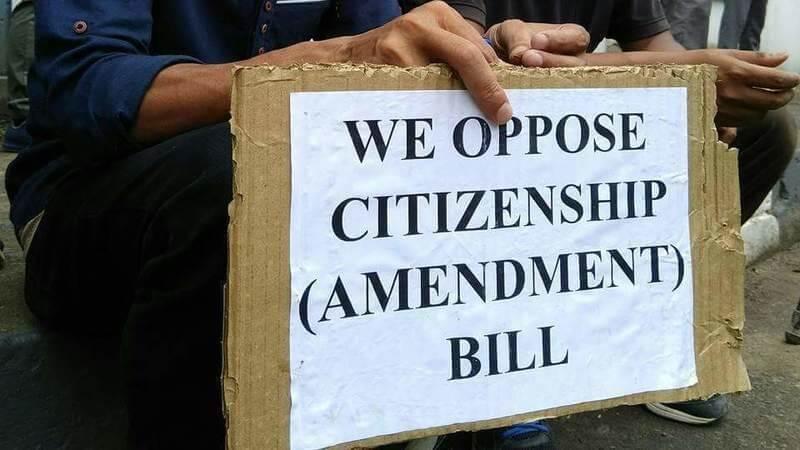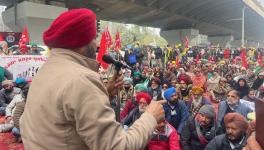Citizenship Bill -- A Thoughtless, Dangerous Business

Representational image. | Image Courtesy: sentinelassam.com
For the past five years, the ruling Bharatiya Janata Party (BJP) has been using legal measures to turn the Indian Constitution upside down. The latest is the issue of the Citizenship Amendment Bill or CAB, which it has raised to serve its own dual purposes.
The Bill raises the heatedly divisive issue of who is to be regarded legally as an Indian citizen. The ruling party sees in this issue an opportunity to mobilise its mesmerised devotees. The citizenship debate will no doubt earn it electoral dividends, for it will wave its flag before its followers to consolidate its position further. The snag is that the Bill flies in the face of the secular character of our Constitution, which was embraced by all previous governments—even saffron ones—so far.
The last time the CAB was introduced in Parliament, in 2016, it came within an inch of passing into law in 2018. At that time, it had proposed (as the preamble to the Bill said) that religious refugees of all faiths except Islam from neighbouring countries would gain not just political asylum but citizenship of India. It gave no reason for the exclusion of persecuted Muslims—obviously because there is no constitutionally valid logic for this.
Additionally, the application fee to seek admission into India was reduced to a bare minimum of Rs100, and the period of residence required to qualify as a citizen was reduced from 11 to six years.
Even before this Bill was passed into law, the Central government issued letters to district collectors of states, such as Rajasthan, Punjab and Haryana, modifying the rules under the Foreigners Act of 1946 and the Indian Passport Act of 1956.
Through these modifications, the BJP government wants to exclude non-Muslim migrants from the requirement to produce documents about their antecedents and so on. Thus, from the very beginning, there was an attempt to casually bypass established law in the interest of the government in power.
The stress on religious persecution as the reason for grant of citizenship in such a casual manner struck a sympathetic chord among earlier generations of refugees, who had borne the brunt of Partition violence. But it is not all that certain that such newcomers, especially in the North East, had fled religious persecution. For, a sizable section had come across the border from Bangladesh seeking better prospects. The North East is the favoured destination for such migrants from Bangladesh, as both the climate and presence of considerable number of Bengalis in Assam made their transition more comfortable.
That said, the CAB is a thoughtless and dangerous business. Unlike the immediate decades after it was founded, today’s Bangladesh is ruled by a government that has learnt the dangers of religious bigotry the hard way.
Bangladesh Prime Minister Sheikh Hasina actively courts Hindu voters and is committed to protecting their interests. If Hindus leave her in the lurch and decamp en masse, it will not only weaken her hold over the country’s politics and people, but facilitate another retreat of the State, which will boost fanatical Islamic politics and inflame communal frenzy on both sides of the border.
Already, many prominent Hindu leaders of Bangladesh have deplored the Indian government’s initiative. They fear it can set alight the fuse of genocidal violence.
On the Indian side of the border in Assam and the North East, all indigenous ethnic groups, without exception, are alarmed by this Bill. Despite the Centre’s soothing words, they are determined to resist it. The indigenous people of the region already perceive a threat to their political and cultural survival. Due to their sense of vulnerability, their idea of citizenship is already fragile. Even the Bengali settlers from an earlier period have deep misgivings that the CAB misadventure will once again put their lives at risk.
It goes without saying that the situation has fomented a fertile ground for all kinds of heedless chauvinism, which can easily play into the hands of saffron manoeuvres.
In Assam, the CAB will have distinctive and peculiar repercussions. It is openly understood by the state’s people that this Bill is being pushed through in order to accommodate all Hindus who have been left out of the National Register of Citizens or NRC, an exercise only recently concluded in Assam.
BJP leader Himanta Biswa Sarma has reconfirmed to the press what Home Minister Amit Shah declared in Parliament, that the NRC process in Assam (with 1971 as the base year) is going to be junked and conducted again, along with a proposed national NRC, in which 1951 will be the likely base year.
For good measure, Sarma added that the Assam government had always opposed the present NRC -- lock, stock and barrel, and that the new NRC would be after its own heart.
The fact is that for three long years, the BJP supported the NRC quite exultantly. It had hoped that by the end of 2018, just before the NRC procedures ended, four million (40 lakh) people would be out of the final draft. Rumours were flying around that a great majority of those excluded were Muslims. It was only in August this year, when the final revised version was released, that it became clear that only 1.9 million (19 lakh) had been dropped and as many as one million (10 lakh) of them were Hindus.
At this stage, the Assam government lost its enthusiasm and began casting doubts on the NRC process. By the way, many groups who had persuaded the Supreme Court to speed up the NRC process, using 1971 as the cut-off year, had rent the air with their cries that the just-concluded NRC was a farce. It was already their demand that a new one should be started, with 1951 as the cut-off year.
There was a demand for NRC in Assam, arising out of circumstances specific to Assam. But nowhere else in the country has there ever been any such demand. Now with a nationwide NRC, the government will encourage such a demand with a barely-concealed communal bias, and use it to divide people.
The communal message from what BJP is doing now is loud and clear. The new (sectarian) condition for grant of citizenship and the six-year waiting period instead of 11 years is pointless, considering district collectors have already been instructed not to insist on documents from arriving immigrants. Setting up December 2014 as the limiting date also makes no sense. It is, in fact, an open invitation to all Hindus of Bangladesh to pack up and troop into Assam.
A sideshow has been the ignominy in which the NRC coordinator, Prateek Hajela, has been made to leave his post and shunted off to distant Nagpur. Apparently, this was done on his own appeal to the SC, under the now-familiar sealed cover.
Significantly, Hajela was given a warm send-off by employees who had worked under him. Before his departure, he affirmed that the number of genuine citizens computed under his watch would turn out to be the final and correct figure.
Incidentally, 900,000 (9 lakh) of the 1.9 million (19 lakh) excluded from the NRC did not make it on the list only because government agencies in West Bengal and Bihar failed, despite repeated reminders, to confirm that documents submitted by these applicants had indeed been issued by them. (This was Hajela’s ingenious way of marking off genuine from fake documents.)
Now a remarkable and climactic sequel is unfolding in the state. Hitesh Dev Sarma, the 1989-batch IAS officer appointed to succeed Hajela, has reportedly denounced his predecessor as “corrupt and inefficient” in a Facebook post. Sarma has charged Hajela with fraudulently inveigling five to six million or 50-60 lakh [Muslim] names into the NRC. The scandal this raised forced the government to defer his appointment. It gave the pretext that Sarma is on a month’s leave. But now the government has piped up again, approvingly speaking in favour of the Home Minister’s statement in Parliament. It can easily shrug off all responsibility and just wind up the just-concluded NRC in Assam.
It is amply clear that the secular principle which the opponents of CAB are defending is of not the slightest concern to the ruling party, which wanted to use the NRC to serve its own purpose. When it appeared that things might not go its way, the ruling party thought up CAB as a counterweight; indeed as a decisive factor.
The author is a sociopolitical commentator and literary critic. The views are personal.
Get the latest reports & analysis with people's perspective on Protests, movements & deep analytical videos, discussions of the current affairs in your Telegram app. Subscribe to NewsClick's Telegram channel & get Real-Time updates on stories, as they get published on our website.
























